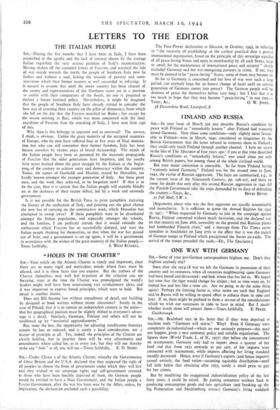FINLAND AND RUSSIA
Sta,—In your issue of March 3rd you describe Russia's condition for peace with Finland as "remarkably lenient" after Finland had wantonly joined Germany. Now those same conditions—only slightly more favour- able to Finland—were in March, 1940, considered so iniquitous by the British Government that the latter refused to transmit them to Finland ; they could only reach Finland through another channel. I have no access to the files of The Spectator of four years ago: if you at that time described Russia's conditions as "remarkably lenient," you stood alone not only among British papers, but among those of the whole civilised world.
But your major contention is untenable. So far from Finland having "wantonly joined Germany," Finland was for the second time in June, 1941, the victim of Russian aggression. The facts are summarised, e.g., in the current issue of the Nineteenth Century, pp. 1o6-1o7, and leave no room for doubt that only after this second Russian aggression in 1941 did the Finnish Government take the steps demanded by its duty of defending
[Arguments about who was the first aggressor are usually interminable and inconclusive. It is sufficient to quote the Annual Register for 1941 (P. 241): "When requested by Germany to join in the campaign against Russia, Finland consented without much hesitation, and she declared war on that country on June 26th, ostensibly on the ground that Russian planes had bombarded Finnish citieS," and a message from The Times corre- spondent in Stockholm on June 27th to the effect that it was the transit of German troops to Finland which precipitated the Soviet air-raids. The arrival of the troops preceded the raids.—En., The Spectator.]


























 Previous page
Previous page